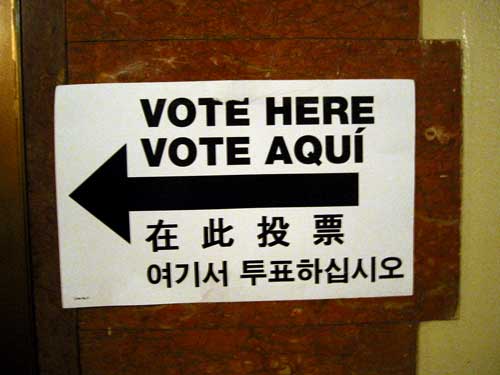With a greater chunk of non English-speaking voters headed to the polls in swing states next month than ever before in American electoral history, language has become a dealbreaker on the campaign trail. 2012 presents an array of challenges to the tacit use of English as a campaign language, especially in diverse states and districts facing tossup races.
Both the Obama and Romney campaigns have aired Spanish-language television and radio ads in Arizona, Florida, Nevada, and Pennsylvania seeking to curry Latino votes. While Obama won the Latino vote handily in 2008, a Univision poll reveals that over thirty percent of Latino voters are undecided and Romney has stated his intention to capitalize on this indecision.
Tight Congressional races in Arizona, Nevada, and Florida also rely heavily on Latino votes, eliciting a wave of Spanish-language ads from various points on the political spectrum. Dean Heller, a conservative Senator running for reelection in Nevada, recently recorded an ad with his wife speaking in broken Spanish to a largely Mexican American audience. Democratic contender Richard Carmona, a Puerto Rican candidate and former solicitor general running for a Senate seat in Arizona, has utilized Spanish-language ads to help court a Latino electorate in a state whose Democratic delegation in Congress has overseen issues of immigration reform and other critical issues that have impacted Latino votes.
Yet the politics behind campaign language extend beyond the strategic use of Spanish to curry important votes. Conservative rhetoric has taken a decidedly anti-immigrant turn in heavily Latino states over the past ten years, creating room for laws like Proposition 103, which rendered English the official language of Arizona. Conservatives’ use of Spanish-language advertisements to win Latino votes in states like Arizona reeks of irony – many candidates who were avid supporters of bills like Prop 103, not to mention AB1070 (also in Arizona, which eased deportation for those pulled over by cops anywhere in the state), now pump out ad campaigns in Spanish in an effort to maximize their outreach.
Furthermore, efforts to halt funding for ballot translation in districts where many voters do not speak English has become a conservative strategy across the country, despite provisions in the Voting Rights Act that prohibit language discrimination and mandate bilingual ballots in districts that include high concentrations of non-English speakers. In a televised primary debate six months ago, Romney agreed with fellow GOP candidate Newt Gingrich that English should be enshrined as the nation’s official language.
